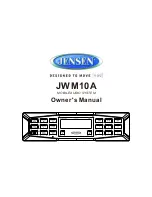
4
GB
DESCRIPTION:
Flush-mounted monitor with "open voice" twin channel and 3,5''
colour LCD screen, for DIGIBUS electronic door entry system with
coding.
PUSH-BUTTONS AND ADJUSTMENTS
A) 3.5’’ LCD
Screen
B) Microphone
C) Loudspeaker
D1-D2)
Pair of push-buttons:chime choice / lighting adjustment
E1-E2)
Pair of push-buttons: chime volume / contrast adjustment /
volume adjustment audio line
F)
Command function F1
G)
Command call to the switchoboard or door lock (when
monitor is called)
H)
Command function F3, F4, F5
I)
Push-button talk / listen, for conversation enabling. After
the call and/or switch-on of the monitor, hold the push-button
down for conversation with the speech unit.
L)
LED Sign for external activation
M)
Led indicator for chime exclusion / various programmings
1)
Command outdoor lock push-button (500ms short on
the secondary audio function)
2)
Function command F2
3)
Function command F6
4)
Function command F7
5)
Function command F8
6)
Function command F9
TERMINAL BLOCK
1)
Digital call line
2)
Secondary entrance panel audio line
3)
Audio line
4)
Negative line
5)
+ 13,5V DC line
6)
Inserted monitor signalling (for additional chimes or other ser-
vices)
7)
Monitor negative line
8)
Monitor positive line
9)
Line for outside door call.
10) Supply voltage for video floor distributor
11) F1 - connection for auxiliary functions, to be connected if indi-
cated on the diagram.
12)
Not used
13)
Supply voltage for green LED indicator
V1) Input for the video signal
M) Video
earth
V3) Video signal input for cable other than coaxial
PROGRAMMING THE NUMBER/CALL CODE
With monitor switched off, operate as it follows:
Press simultaneously and hold the “
I
” and “
H
” push-buttons.
Wait for 3 seconds until the red led “
M
” starts flashing. Release
both push-buttons “
I
” and “
H
” and press the “
G
” push-button within
5
seconds for at least 3 seconds until the red LED “
M
” is steadily lit.
Now the device is on programming mode and can receive the num-
ber to code from an entrance panel or from the programmer. At the
code reception and after a correct programming, the red led
M
swit-
ches off and the device returns to the basic mode.
OUTDOOR CALL
Through a dedicated terminal cabling it is possible to discriminate
the call tone coming from an outdoor push-button (for example pas-
sage, secondary entry etc.) from that coming from an outdoor sta-
tion. Terminal 9 is preset for the input of the call wire for an apart-
ment entrance panel (the speech unit Art. 930D) or for a simple
push-button N.A. (connected between 9 and 5) which make the
monitor ring through a programmed chime.
On receiving an apartment outdoor call it is possible to turn the moni-
tor on and send a digital command able to switch the video signal in
the entrance with that of a possible camera on the apartment door.
To do so you must enable the monitor switching on (from outdoor call
unit by pressing the “
D1
” and “
E1
” push-buttons, being the monitor
switched off, until the red led “
M
” flashes and then pressing the “
H
”
push-button) and choose the command to route (by pressing the
“
E1
” and “
E2
” push-buttons (with monitor off) until the led
M
flashes
and press then the push-button corresponding to the function,
,
,
,
,
,
, to be routed).
“UNANSWERED CALL” FUNCTION
By means of an external entrance panel this type of function allows
the user to signal his absence to the calling visitor; it may also be
used when the user is at home, but does not want to answer. When
the function is enabled the video-interphone receiving the call does
not emit an acoustic signal, but sends a “USER ABSENT” command
to a possible switchboard and, in addition, makes the “
M
” red LED
flash as many times as the ananswered calls (max 4). To enable this
function, it is enough to press and hold the “
D1
” and “
E1
” push-but-
tons (with monitor off) until the led
M
lights up, then press the “
I
”
push-button; the Led “
M
” will light up and remain ON to show the
function is active.
To disable this function, with monitor off, press and hold the “
D2
” and
“
E2
” push-buttons until the led
M
lights up and then press the “
I
”
push-button; the led switches off.
CHOOSING THE RING TONE
With monitor off, press push-button “
D1
” or “
D2
” for nearly 5 seconds
to choose the ring tone for the entrance panel call; when the first ring
tone sounds you can scroll all the ring tones by pressing several
times “
D1
” or “
D2
”.
To choose the outdoor call ring tone, (always with monitor off) press
“
D1
” and “
D2
” simultaneously for nearly 5 seconds until the red led
“
M
” flashes intermittently; now press “
D1
” or “
D2
” to choose the ring
tone.
CHIME EXCLUSION
To adjust the chime volume, with monitor off press “
E1
” or “
E2
” for at
least 5 seconds until the chime associated with the entrance panel
starts ringing. Now increase or decrease the volume by pressing the
“
E1
” or “
E2
” push-button respectively. You can get the chime exclu-
sion by pressing continuously the “
E2
” push-button until the red led
“
M
” switches on.
SELECTING THE VIDEO INPUT
The double switch on the rear of monitor selects the input video
signal: for the coaxial type cable or for the double cable.
VIDEO ADJUSTMENT
The colour adjustment is carried out by a trimmer on the rear of
monitor. The brightness and contrast adjustment is made with moni-
tor on and by two digital trimmers pressing the “
D1
”, “
D2
” and “
E1
”,
“
E2
” push-buttons respectively.
AUDIO ADJUSTMENT
To adjust the audio volume, (during a conversation) press the “
E1
” or
“
E2
” push-button together with the “I” push-button.
OPERATION
Monitors type 6614, 661D, 6714 must be used only on digital Digibus
type ELVOX video-interphone installations; for the supply voltage
use only the digibus range power supplies (for example type 6948).
The digibus system allows you to carry out installations with digital
type device and command identification. According to the installa-
tions configuration, each device connected is identified by a 4 or 8
univocal numerical code and it is able to receive and send a data
packet containing all the information related to the communication
management; in fact each data packet includes the identification of
the destination device and the command to be carried out. All typical
command operations of a video-interphone system, such as call,
electrical lock release, stair-light switching on etc., are then codi-
fied.The audio and video signals are, on the contrary, analogical type
signals.





































